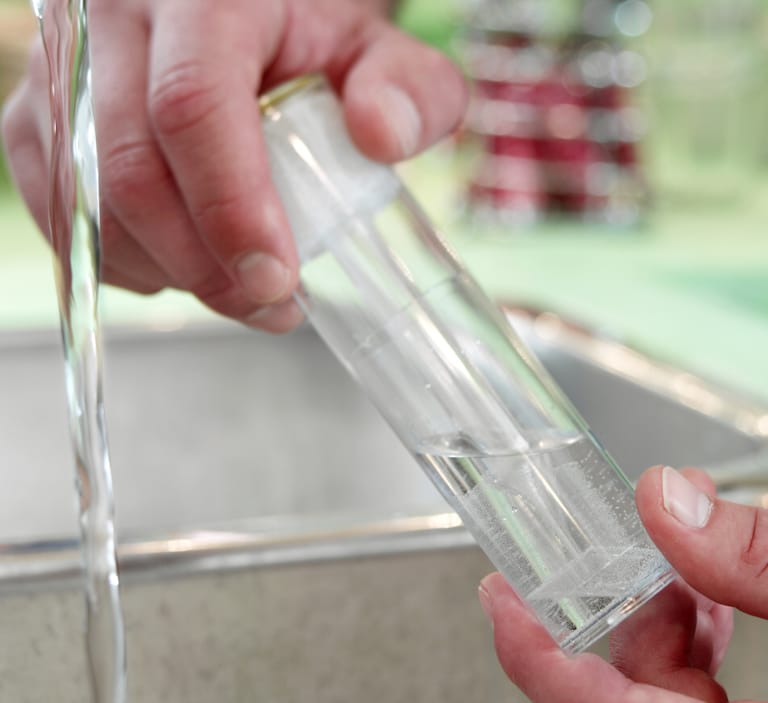Getting The Well Water Testing To Work
Wiki Article
What Does Well Water Testing Mean?
Table of ContentsThe Main Principles Of Well Water Testing Facts About Well Water Testing UncoveredThe 45-Second Trick For Well Water TestingFacts About Well Water Testing Uncovered

Government companies do not check or manage water top quality in personal wells, and water screening is not needed by any kind of federal or state guideline. If you are among the 1. 7 million Georgians with a private well, you are accountable for the quality and safety and security of your well water.
Appropriately built and maintained water wells can provide several years of trouble-free solution. Nevertheless, surface area pollutants might get in the well if it is not effectively created and maintained, and the well may at some point deteriorate or come to be damaged as it obtains older - Well Water Testing. On top of that, some groundwater naturally contains several chemical materials at degrees above the EPA's health-based criteria, called the Maximum Pollutant Levels (MCLs)
Test the water when annually for complete coliform germs, nitrates, total liquified solids and p, H degrees. If you believe various other pollutants, you should evaluate for those. In contrast, the quality of water in malfunctioning wells may change suddenly and remain unnoticed as the water might look, smell and taste the exact same.
The Facts About Well Water Testing Revealed
Minimum Testing Recommendations Well, Maintenance Annual All geographical regions Nitrates (Overall Nitrate and Nitrate+Nitrite) Annual Annual Fundamental Water Chemistry (see below) plus Alkalinity, Soluble Salts (or Overall Dissolved Solids), Nitrate, Chloride, Fluoride and Sulfate At First and after that every 3 years p, H, Solidity, Light Weight Aluminum Calcium, Chromium, Copper, Iron, Magnesium, Manganese and Zinc Annually after initialcomprehensive water chemistry Additional Testing Recommendations Verification of Possible Contamination At the very least once and after that yearly follow-up for:1) homes with plumbing that pre dates the 1987 plumbing codes with copper piping with lead solders2) extremely old homes in which there are lead pipes3) residences with brass and/or chrome components (brass includes 3-8% lead; chrome components contains lead) All geographicalregions At least once and afterwards a yearly follow-up Southern Coastal Level area listed below the "Fall Line" on the, Georgia map A minimum of once and after that an annual follow-up Piedmont-Blue Ridge regions above the "Autumn Line" on the Georgia map Volatile and Semi-volatile Organic Substances, Chemicals, Oil Hydrocarbons and Various other Organics Not required on a routine interval; recommended only when contamination is suspected. Well Water Testing.
Samples accumulated from a cooking area tap would show the source water properties plus any kind of possible contamination from the well owner's supply of water system. Tasting at the wellhead for lead is not required, yet sampling from the faucet for lead would certainly suggest if lead solder was used in the plumbing.

The key MCLs have been set at concentrations that supply a vast margin of protection from Click This Link unsafe health effects for most individuals over a lifetime of alcohol consumption. Although key MCLs are enforceable criteria for PWSs only, personal well proprietors may choose to comply with these criteria to protect themselves from the prospective health danger of alcohol consumption infected water.
Getting My Well Water Testing To Work
The alcohol consumption water requirement for nitrate is 10 ppm; above this degree nitrate can have unfavorable effects on human wellness, especially infants under the age of 6 months. For added info the MDH has nitrate in drinking water sources online. You might likewise get in touch with the MDH at 800-383-9808. Pesticides are substances made use of to avoid, destroy, ward off, or alleviate insects.Cyanazine breaks down in the setting into different chemicals. Several of the break down items of cyanazine have been detected in Minnesota water. Pesticide evaluation in water samples can be expensive and the use of details pesticides can differ throughout the state making it challenging to recognize which pesticide to examine.
Based on this, we suggest that you get in touch with the MDA before sampling your well for chemicals. The advancing or compounding health and wellness risk related to reduced levels of multiple chemicals in drinking water is not well comprehended currently. Well Water Testing. As a whole, at risk populations such as babies, youngsters, and pregnant/nursing women are at best Read Full Report risk
Even more than 70,000 personal wells owners will be offered nitrate testing in over 300 towns.
Not known Facts About Well Water Testing
The MDH recommends making use of a recognized laboratory to examine your water. To determine a laboratory to have your well water tested, most likely to Minnesota Department of Wellness (MDH) Licensed Ecological Laboratories. The personalized search tab on this page permits you to look for a research laboratory that accepts samples from exclusive property owners.When possible, it is best to eliminate sources of contamination or change a contaminated water supply with a more secure water system instead of rely upon a home water treatment device. Also, the expense to evaluate for chemicals in water may go beyond the expense of a point-of-use home therapy system, such as reverse osmosis for alcohol consumption water.
If you choose to install a home water therapy device, the unit (or systems) you select should be licensed and labeled to lower or remove the compound you are worried concerning. If there is even more than one material you desire gotten rid of from your water, you might need to combine from this source numerous treatment procedures right into one system.
Report this wiki page